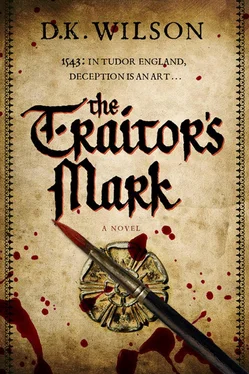D. Wilson - The Traitor’s Mark
Здесь есть возможность читать онлайн «D. Wilson - The Traitor’s Mark» весь текст электронной книги совершенно бесплатно (целиком полную версию без сокращений). В некоторых случаях можно слушать аудио, скачать через торрент в формате fb2 и присутствует краткое содержание. Год выпуска: 0101, Издательство: Pegasus Books, Жанр: Исторический детектив, на английском языке. Описание произведения, (предисловие) а так же отзывы посетителей доступны на портале библиотеки ЛибКат.
- Название:The Traitor’s Mark
- Автор:
- Издательство:Pegasus Books
- Жанр:
- Год:0101
- ISBN:нет данных
- Рейтинг книги:5 / 5. Голосов: 1
-
Избранное:Добавить в избранное
- Отзывы:
-
Ваша оценка:
- 100
- 1
- 2
- 3
- 4
- 5
The Traitor’s Mark: краткое содержание, описание и аннотация
Предлагаем к чтению аннотацию, описание, краткое содержание или предисловие (зависит от того, что написал сам автор книги «The Traitor’s Mark»). Если вы не нашли необходимую информацию о книге — напишите в комментариях, мы постараемся отыскать её.
The Traitor’s Mark — читать онлайн бесплатно полную книгу (весь текст) целиком
Ниже представлен текст книги, разбитый по страницам. Система сохранения места последней прочитанной страницы, позволяет с удобством читать онлайн бесплатно книгу «The Traitor’s Mark», без необходимости каждый раз заново искать на чём Вы остановились. Поставьте закладку, и сможете в любой момент перейти на страницу, на которой закончили чтение.
Интервал:
Закладка:
The girl gave a shy smile by way of acknowledgement.
Lizzie made no further argument. It was arranged that I would set off into Kent three days later with my augmented household. While the servants completed the work of closing up the house and workshop and loading on to wagons the furniture and other goods which had to be taken into the country, I tidied up my business affairs.
I also had a visit to make.
I rode out next morning, Friday 4 September, through Ludgate and over the Fleet Bridge. Turning left into narrow Bride Lane, I had only a few yards to go before dismounting in the shadow of the high walls bordering the precinct of old Bridewell Palace. A row of quite substantial houses clustered by the boundary, as though enjoying royal protection. Three of them belonged to alien goldsmiths, a little nest of foreigners who could stare out from their casements at the City wall, mere yards away, and disregard the Guild rules binding honest London craftsmen. They could take on and train their own apprentices (usually of their own ilk), attract their own customers and charge their own prices. Theoretically the Worshipful Company exercised control over the quality of the interlopers’ merchandise. All gold items had to pass through our assay office, which authenticated the purity of the precious metal. But many of the foreigners (and there were more than a hundred of them working in and around London) ignored the regulations. In practice, we were powerless to prevent them stealing our markets. We were obliged to compete with them for quality – and some of them were hellishly good. This was bad enough but at least the distinction between us and them was clear. There were, however, a few who deliberately blurred that distinction; who had cunningly worked themselves into a position of being able to enjoy the advantages of life on both sides of the wall. One such was John of Antwerp.
He had run this workshop on Bride Street longer than anyone could remember. He was a fine craftsman – of that there was no doubt. He attracted custom from the highest in the land and he had prospered – really prospered. He married an Englishwoman. He reared a family. But he remained staunchly a Netherlander. He had another home in Antwerp and spent months there every year. That, of course, was his privilege. But a few years ago he had sought to be made a freeman of the Goldsmiths’ Company. That led to fierce arguments among the members. It split us into rival factions. But John of Antwerp had friends. Rich friends. Powerful friends. He secured his election. Well, he might have won the right to sit at our board, to worship in our chapel (despite his Lutheran opinions), to vote at our assemblies, but few of us could accept him as one of us. His presence in our midst remained an irritant.
A notice was pinned to the door of the largest of the three houses. It informed callers that Master Jan van der Goes (he did not even accept the Englishing of his name) had closed his workshop until the plague abated but that prospective clients could find him most mornings between ten and noon at the sign of the Red Hand in Fleet Street. I turned Golding’s head and a few minutes later tethered him outside the prestigious inn frequented by barristers of the inns of court, visitors with business at Whitehall Palace and gentlemen attendant on the great men whose nearby fine houses on The Strand overlooked the river.
There were not many people in the fashionable inn. August and September were always quiet in this locality. The royal household was on progress and the law courts were not in session until Michaelmas. Students and teachers at the law schools usually took the opportunity to go into the country between terms. Even so, it was unusual to see most of the tables in the Red Hand’s large hall empty. However, even had the room been all a-bustle and crowded with customers, it would have been easy to locate John of Antwerp. His booming voice could always be heard at a distance and he was seldom to be seen without a throng of sycophantic admirers. Today his attendants had been reduced to three in number. They sat at a table by an open casement, taking advantage of the slight breeze that whiffled through the room.
‘Brother Treviot,’ the Fleming bellowed as I approached. ‘This is an unexpected pleasure. Simon, fetch a flagon for our distinguished guest.’ This instruction was given to an apprentice who immediately rose and hurried about his errand. John was a heavily built man in his fifties who affected the manners and dress of someone twenty years his junior. Today he sported a yellow doublet and a shirt open at the neck. His cap was pushed back on his bush of brown hair and his thick beard completely encircled his ruddy features. He waved me to a seat on the bench opposite and introduced his companions. They were Reynold, a slim young man in royal livery, and Sir Tobias Harriday, a priest from Worcester.
‘Reynold is a messenger come hot-paced from court,’ John explained. ‘And Sir Tobias is here to order a new set of altar plate.’
‘For our Prince Arthur chantry chapel,’ the fresh-featured cleric added.
‘Chantry chapel, Brother John?’ I said, unable to resist the taunt, ‘I thought you did not approve of prayers for the dead and what you call “popish superstition”.’
The Fleming was unfazed. ‘His majesty wishes to honour his late brother’s memory with a magnificent gift of gold plate for the tomb chapel. I’m honoured to help this pious and charitable act. But tell me, Brother, what brings you to the Red Hand? I thought you had left the City.’
‘I’m only here briefly. I have to collect some designs from Master Holbein.’
‘Will that be for the Cotes Cup?’
I nodded and just managed a smile. The foreigner seemed damnably well informed about my affairs.
‘Johannes told me he was working on it,’ he explained.
‘Do you happen to know his whereabouts at the moment?’ I asked. ‘He seems to be from home.’
Simon returned and set a full tankard before me. I raised it to my lips, watching John over the brim.
He took his time over the reply, obviously thinking carefully what to say. ‘I heard there was some trouble at his house recently.’ His tone was nonchalant.
‘Yes, Wednesday. Some ruffians broke in and killed his assistant.’
‘What? Young George? How terrible.’ His pretence of shock and surprise was not convincing. He obviously knew more than he wanted to admit. I began to think I was wasting my time with the fellow.
‘Indeed. It was fortunate Master Johannes was not there. You have no idea where I might find him now?’
‘When I saw him last, a few days ago, he was on his way to court. He was talking about some commission he had for the new queen. I suppose he is still there.’
‘Perhaps Master Reynold, here, may have seen him.’ I turned to the messenger. ‘Where is his majesty keeping court now? Do you know if our artist friend is there?’
The young man was glad to air his knowledge. ‘The court’s at Ampthill Castle, near Bedford. It’s small for the whole court but his majesty vows he’ll not come a mile nearer London as long as the plague lasts.’
‘Ampthill – was that not where Queen Catherine was kept?’the priest asked.
‘Aye, that she was,’Reynold replied.
‘God keep her!’ Harriday crossed himself. ‘The kingdom has gone from bad to-’
‘So,’ I interrupted impatiently. ‘Is Master Holbein there?’
‘Was,’ the messenger replied. ‘Her majesty commanded him there to paint likenesses of the king’s children. The princesses are travelling with the court but Prince Edward lives nearby at Ashridge.’
‘So, the artist is no longer there?’ I prompted.
I think he left at the beginning of the week.’
‘To come back to London?’
Читать дальшеИнтервал:
Закладка:
Похожие книги на «The Traitor’s Mark»
Представляем Вашему вниманию похожие книги на «The Traitor’s Mark» списком для выбора. Мы отобрали схожую по названию и смыслу литературу в надежде предоставить читателям больше вариантов отыскать новые, интересные, ещё непрочитанные произведения.
Обсуждение, отзывы о книге «The Traitor’s Mark» и просто собственные мнения читателей. Оставьте ваши комментарии, напишите, что Вы думаете о произведении, его смысле или главных героях. Укажите что конкретно понравилось, а что нет, и почему Вы так считаете.












